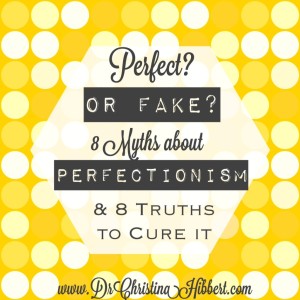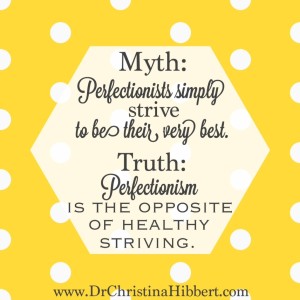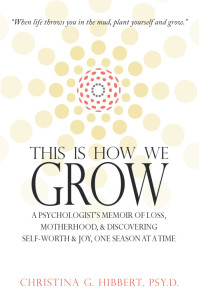
19 Mar “Perfect?” or “Fake?”: 8 Myths about Perfectionism & 8 Truths to Cure It
 Are you a perfectionist? Not sure? Well, do you…
Are you a perfectionist? Not sure? Well, do you…
- Set unrealistically high goals/standards for yourself and/or others?
- Judge yourself based on what you do/don’t accomplish?
- Have a hard time stopping a project until it’s exactly how you want it?
- Have trouble relaxing in even a small mess at home?
- Feel like a “failure” if you can’t do things just right?
If you answered “yes” to one or more of these, you probably struggle with perfectionism.
“Perfect?” or “Fake?”: The Problem of Perfectionism
As a women’s mental health expert, I’ve helped my fair share of perfectionists. They don’t usually come in for help with perfectionism, though—more like help with underlying depression, anxiety, relationship issues, or overwhelming stress. Yes, these are all consequences of perfectionism, along with other things like poorer health, mental well-being, and overall life satisfaction.
That’s the problem with perfectionism–it isn’t what it appears to be at all. Perfectionism is a false exterior that covers up other, deeper issues. It’s a mask.
8 Myths about Perfectionism & 8 Truths to Cure It
Only once we identify perfectionistic behaviors and personality traits can we begin to do something about it. Let’s look at some of the myths of perfectionism, therefore, and some of the truths. Hopefully, these will open our eyes, educate us, and begin the perfectionism recovery process:
1) Myth: “Perfect” means “without faults;” with hard work and dedication, it’s possible to achieve this state of being.
Truth: “The Greek translation of the word ‘perfect’ actually means, ‘complete,’ ‘so good that nothing of the kind could be better,’ and ‘that which has attained its purpose.’” (This is How We Grow, p. 270) This is a much different ideal than striving to be “without faults.” Perfection isn’t possible; it isn’t real, and this makes perfectionism a real problem for many people, especially women. None of us is or ever will be “perfect,” or “without faults.” “Seeking to do right, to be complete, to live authentically, is the opposite of perfection.” (Ibid, p. 271) And doesn’t that sound so much better, anyway?
2) Myth: Perfectionists simply strive to be their very best.
Truth: Perfectionism is actually the opposite of healthy striving. We tell ourselves it’s good to be a perfectionist; “I just like things to be the best they can be,” we say. But this isn’t true. In fact, research shows there’s a distinct difference between perfectionism and healthy striving:
- Perfectionism is trying to reach an unrealistically high goal or standard—one that can never be reached.
- Healthy striving is setting high but achievable goals/standards.
- Perfectionism is seeing mistakes as evidence of unworthiness.
- Healthy striving is understanding mistakes are part of the process, and being able to more easily get back up after setbacks/mistakes.
3) Myth: Perfectionism leads to success.
Truth: Research tells us perfectionism actually “hampers success. In fact, it’s often the path to depression, anxiety, addiction, and life-paralysis.”[1]
4) Myth: It’s good to desire positive outcomes, and that’s what perfectionists do.
Truth: Perfectionism focuses only on the outcome, and it leaves no room to feel “positive” about it. Life isn’t about achieving a perfect outcome—whether it’s a dinner you’re making, keeping your house spotless, or the vision you have for how your life will turn out. It won’t turn out perfectly. Trust me. Life is about curves and twists and surprises. If we want to be healthy and happy, we must learn to recognize the beauty in the process of life, not the outcome.
5) Myth: Perfectionists are just natural leaders, and that’s why they like to be in “control” of things and people.
Truth: Perfectionists actually feel out of control. That’s why they so desperately need to control everything around them. Deep down, perfectionists are terrified of being seen as they really are—as a real individual with strengths and weaknesses. Unfortunately, much of life is out of our control, and no matter how hard you try to control life, it’s never going to work. That’s why perfectionism leads to stress and unhealthy habits/conditions: it’s a never-ending pursuit of a false ideal.
6) Myth: Perfectionists are confident and secure, that’s why they work so hard and always look and act “perfectly.”
Truth: Perfectionism, at its core, is all about insecurity. When working with perfectionists, I always end up working on self-esteem and self-worth. That’s the true cure for perfectionism—discovering your true, innate worth, getting in touch with and learning to love the real you.
7) Myth: Perfectionism is a strength.
Truth: Perfectionism is a weakness, and at its worst, an illness. That’s why I used the word, ‘cure,’ above. Though there are certainly some benefits to perfectionism–like the motivation and drive to, say, stick with an exercise plan or achieve a big goal–perfectionism is all about working to achieve an unrealistic standard. It usually involves holding others to that same standard, driving everyone crazy (yourself included) in the process. Perfectionism is a mask for the underlying problem—not feeling like “enough.” Those who struggle with perfectionism feel unworthy of love and attention, so they seek it through what they do. But this is a recipe for overwhelm, stress, poor health, and yes, failure. Thus, in the end, perfectionism acts more as a weakness than a strength.
8) Myth: If you’re a “perfectionist,” you’ll always be that way.
Truth: Perfectionism is a choice, and with education, hard work, and dedication, you can choose to cure your perfectionistic side. You can choose to let things go. You can choose to see beauty in the process. You can choose love—love of your life, your family, and yourself.
The Good News About Perfectionism
If you see yourself in any of these myths, please take heart in the truths. Let them open your eyes to another way of living–let them inspire you to begin today to kick the perfectionism habit. Take a searching look at how perfectionism treats you. Like a bad boyfriend, it tells you you’re never good enough, makes you work to receive love, and never lets you quit. “He’s no good for you,” I say. No darn good. Time to let him (or rather, it–perfectionism) go.
Check out my series on “How to Feel Self-Worth.” It’s a great place to begin to dump perfectionism and learn to love the real, beautiful, imperfect you.
Are you a perfectionist? Do you see yourself in any of these myths or facts? What stands out for you after reading this? Leave a question/comment, below, and let us know what you think!
Be sure to check out Dr. Hibbert’s Amazon Bestseller, This is How We Grow–
available now on Amazon.com!
Join my This is How We Grow Personal Growth Group!
FREE. Online. Growth. What more could you ask for?
Don’t miss a thing!
SUBSCRIBE, just below, “like” my Facebook pages (Dr. Christina Hibbert; This Is How We Grow), and follow me on Twitter,Pinterest, & Instagram!
You may manage your subscription options from your profile
Related Posts/Articles
5 Reasons Self-Esteem is a Myth
If Self-Esteem is a Myth, then What is the Truth?: Understanding Self-Worth


So I might have some serious tendencies towards wanting to be a perfectionist but you would never know it because I give up before I get it done.
Haha! Love that! Well I’d say you cure your tendencies every time. Good for you! 🙂
Oh dear this really sounds like me but it really is the only thing I have…